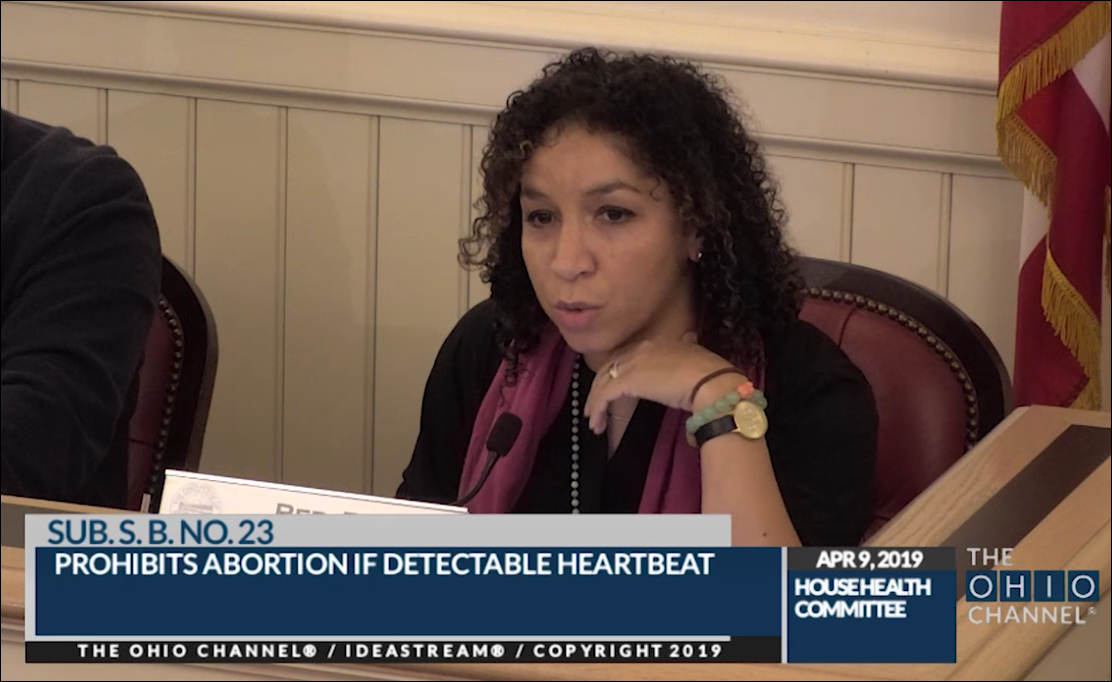Ohio Democrats tried and failed to kill a bill that would prohibit abortions after an unborn baby’s heart is detectable, including one who apparently values the life of black children less than those of other races.
Democratic state Rep. Janie Boyd attempted to attach Amendment 0291 to the so-called heartbeat bill approved by the Ohio legislature last Thursday, and it would have exempted African American children from the abortion protections, LifeNews reports.
The ranking minority member of the House Health Committee offered a lecture to lawmakers about slavery as a justification for urging them to support the exemption, which would have allowed African American women to continue to have abortions until the state’s current threshold of 20 weeks into pregnancy.
“I consider the slave trade and how black slaves were once treated like cattle and put out to stud in order to create generations of more slaves,” she said in a video posted by The Ohio Channel.
“I consider how many masters raped their slaves. I consider how many masters forced their slaves to have abortions, and I consider how many pregnant slaves self-induced abortions, so that they would not contribute children they had to this slave system that was the foundational economic system of our country.”
“And so I submit to you respectfully that our country is not far enough beyond our history to legislate as if it is. And so I ask you, with all of your values, to consider that and vote yes to this amendment.”
State Rep. Derek Merrin, the Republican chairman of the Health Committee, strongly objected to the amendment and urged a no vote.
“I believe, and I believe the majority of this committee believes, the law should be applied equally to all citizens of this state, regardless of race,” he said.
LifeNews pointed to data showing African American women account for a disproportionate number of abortions in America:
According to census data, African Americans make up about 13 percent of the U.S. population but have about 30 percent of the abortions. African-American teenage abortion rates are more than twice as high as the national average, according to research by the Guttmacher Institute.
Research by Protecting Black Life also found that 79 percent of Planned Parenthood surgical abortion facilities are located within walking distance of black and Latino neighborhoods.
Several pro-life advocates were aghast at Boyd’s proposed exemption.
“To reference owning humans as a defense of dismembering them is moral myopia,” Mark Harrington, president of Created Equal, told the news site. “If it is wrong to own humans, it is also wrong to intentionally kill them.”
Harrington called on Boyd to apologize to black families she insulted with the amendment.
“Referencing abortion to avoid consigning children to slavery, she seems to suggest black children today should likewise not be born – which is exactly the purpose of her amendment,” he said. “Every human being is valuable regardless of the color of his or her skin. To suggest that only black babies should be killed in Ohio is shocking racism not benefitting of a representative of the Ohio House.”
It is, however, in line with the eugenic beliefs of Planned Parenthood founder Margaret Sanger, who described immigrants and minorities as “human weeds” and “reckless breeders” who “never should have been born,” according to her 1922 book “Pivot of Civilization.”
The heartbeat bill, renamed the “Human Rights Protection Act,” was signed into law by Gov. Mike DeWine on Thursday, though the ACLU of Ohio has vowed to challenge the measure in court. The law bans abortions as early as five or six weeks – “before many women even know they’re pregnant” – and provides criminal penalties for doctors who violate the law, WOSU reports.
Six states have passed similar laws and all have been challenged by pro-abortion advocates, including a Kentucky law that was blocked by a federal judge last month.
“This is a very clear violation of women’s constitutional rights that have been established for close to fifty years under ‘Roe v. Wade,’ which became the law of the land in 1973,” ACLU of Ohio legal director Frreda Levenson told WOSU. “Women have a categorical right to abortions up until fetal viability.”
Pro-life advocates are hoping the legal challenges will eventually make it to the Supreme Court, providing justices an opportunity to rethink Roe v. Wade, according to the news site.

Leave a Comment
COMMENTS POLICY: We have no tolerance for messages of violence, racism, vulgarity, obscenity or other such discourteous behavior. Thank you for contributing to a respectful and useful online dialogue.